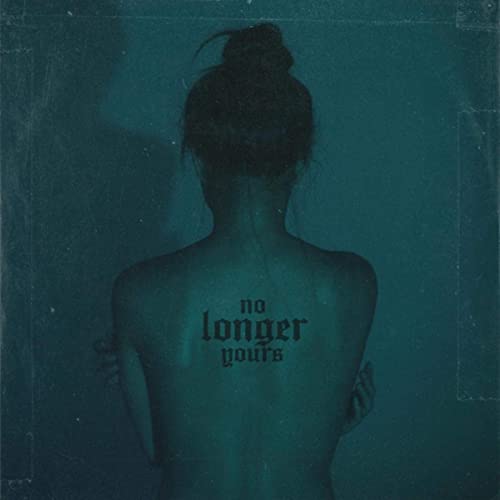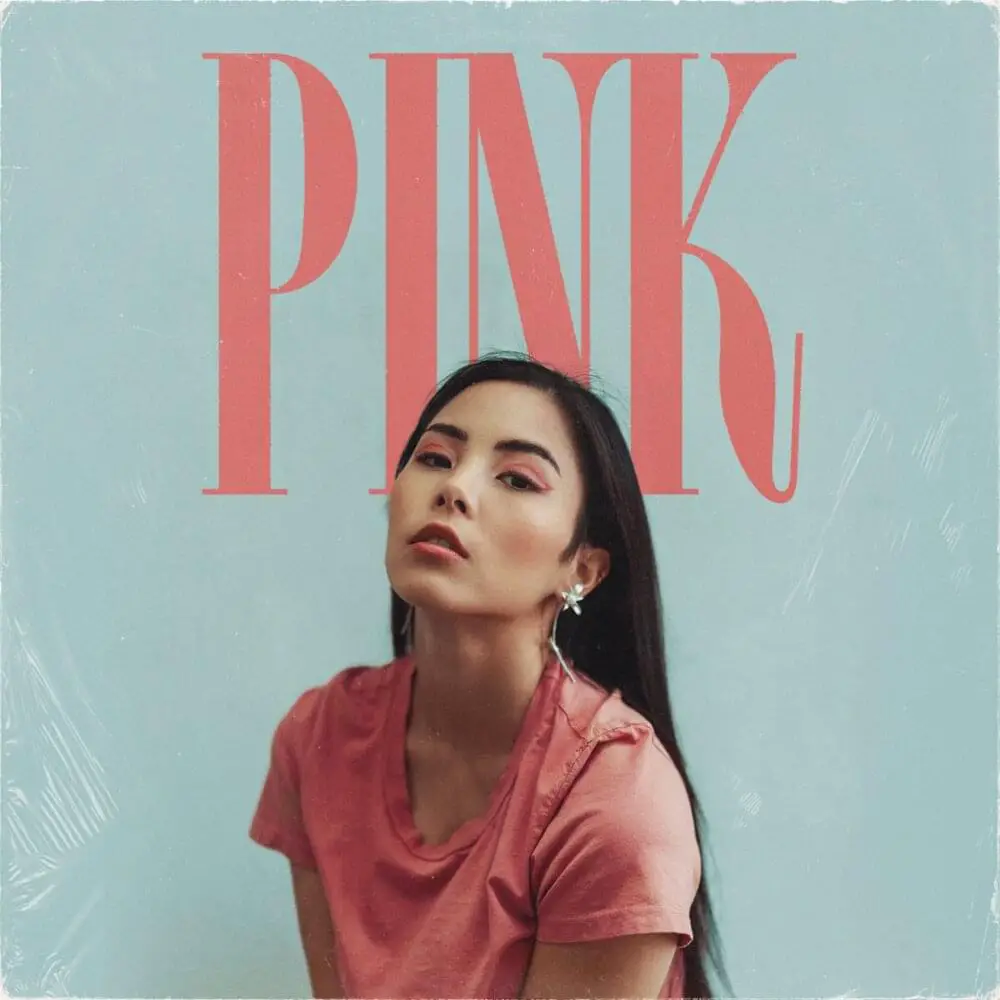Introduction:
On February 19th, actress and YouTube comedian Anna Akana released her second musical project, the EP No Longer Yours, and she further cemented herself as an undeniable bisexual creator. Akana came out in 2018, and a year later she released Casualty, a full-length album that deconstructed a toxic relationship with a male partner. No Longer Yours is the six-song follow-up to Casualty, and unlike its predecessor, she references bisexuality in the lyrics, making queer sexuality a part of the project’s core narrative of freeing herself from the Casualty relationship. The lyrics and film imagery of No Longer Yours position Akana’s recovery as tied to accepting her bisexuality because it means accepting change in her life, unfreezing from the trauma of heartbreak.
Akana wrote the EP with a close group of collaborators, mostly writing with Casualty-collaborators JENGA Productions (Shayon Daniels, Nicci and Jim Funicelli). She first teased the project in August 2020 when she released its lead single ‘Swim’, and the empowerment pop song foreshadowed the EP’s push-and-pull themes of love versus letting go, mental health versus toxic spirals. In a press release for No Longer Yours, Akana is quoted as saying,
“This EP is about the process of assembling the broken pieces and stitching them back together. It’s about the moment you finally see the person who used to make you nauseous and realize it doesn’t sting so much anymore. I had so much clarity about the things that weren’t working for me, what I had to let go of, and how I wanted to shape my life moving forward with more self-awareness about what was within my grasp to change.” (p. 60)
Akana assembles these broken pieces by ordering the tracklist so as to highlight key moments in the Casualty relationship, an almost chronological view of a romance breaking down.
Akana Feels Nothing (But Freedom):

No Longer Yours opens with the anthem of celebratory indifference ‘I Feel Nothing’, and its lyrical themes ripple through the rest of the EP. Its principles of recovery guide the back-and-forth struggle. Akana discussed the song’s importance to her as part of a personal essay for The Daily Beast, writing, “This track was one of the first songs I wrote for the EP[.] […] “I Feel Nothing,” at the time, was a fantasy. A hopeful eventuality. And I wrote it from the perspective of my future self, someday looking back on this period and laughing with amused embarrassment.”
The song finds Akana reflecting on when grief kept her addicted to the past and the subsequent relief to assert that she now feels “nothing at all”. The detailed first and second verses that list out her pain stand in contrast to the simple pre-chorus and chorus lyrics. For the opening verse, Akana sings, “I used to be so hung up/Every night gettin’ drunk/Thinking of you with her/Ah, ah, ah/Didn’t know what to do but/Cry and call you up/Oh baby how it hurt/Ah, ah, ah.” Similarly, the second verse covers her stalled social life: “I used to wait by my phone/Never brought anyone home/Hung onto your t-shirt/Ah, ah, ah/Never wanted you to go/Chose to be alone/Oh baby how it hurt/Ah, ah, ah.”
Thus, she establishes in ‘I Feel Nothing’ that one of the ways that she has been negatively impacted by this heartbreak is that it emotionally trapped her. Her rebirth comes in the form of reembracing the possibility of love, and that love further emerges in the form of acknowledging bisexuality.
Relatedly, the subsequent ‘I Feel Nothing’ music video used camp aesthetics to reinforce the song’s fierce, celebratory independence. It follows Akana throwing a solo banquet in the desert and then as she destroys everything around her. Her costume mainly consists of pink and blue, with the blue part of her skirt having a purplish tinge, recalling the three colors of the bisexual flag.
The pre-choruses and bridge of ‘I Feel Nothing’ have her declaring, “I’m so movin’ on, I’m ready for change”, and then constantly singing, “I feel nothing at all”, in the subsequent choruses. The repetitive language for these hooks serve as mantras and fits into pop music’s long history of catchy empowerment anthems that wrap themselves around one’s brain. Such assuredness being placed first sets itself up to contrast the complicated emotions discussed throughout the rest of No Longer Yours.
After the messy dramatic roller coaster that was Casualty, Akana started on a solid foot of emotional surety that matched the EP’s defiant title. Overall, the emotional shift that frees Akana to more fully live her life haunts the EP as she takes listeners back in time for the following four songs, before bringing them to the present with the ending track ‘Pink’.
‘Pink’ is the closer on this album and wraps some of the various emotional themes of No Longer Yours into a bisexual narrative.
The Casualty of the Self Within a Toxic Relationship:
Song number two, ‘Run’, captures the question Akana asks herself when contemplating a future with her noncommittal, flight-risk partner. She sings, “Why get to know you/When I know you’re gonna/Run nun nun nun/Why meet my demons/When I know you’re gonna/Run nun nun nun.” In the first verse, she also warns herself that “these gold [sic] days are numbered”. Confronting one’s personal issues is central to change, and though Akana frames meeting her demons in terms of a relationship, the lyrics also reflect back on the self. This idea of internal truth resonates through the rest of the EP as she sings about mental health and accepting her bisexuality.
And in the context of the whole EP, ‘Pink’ looms in the future as a revelation born out of struggle, the demonic pain that turns heavenly when Akana stops fighting it.
Furthermore, the song ‘Run’ establishes Akana’s self-perception before the relationship took its toll. In a later verse, she sings, “No my love ain’t set in stone/I can’t leave someone who’s gone/I can’t leave someone who’s gone.” With these lyrics, Akana further shows how this particular relationship froze her, as she goes against her personal moral code, staying with a flaky partner even though he comes to mistreat her. Akana sings about the possibility of him running when listeners instead come to hear all about how she should have been the one to run.
Subsequently, Akana sings about the humiliation of infidelity and asserts her value in ‘You Don’t See Me’. In this song, she narrates a night out at a hotel bar, dressed-up but a “shadow” to her partner and their wandering eye. In the pre-choruses and bridge, she repeats, “You keep looking back but there are diamonds at your feet”, and similarly, she chants in the shouts, “You don’t see me.” Romantic invisibility and disconnection shape this song. The gold days burnt out, and she feels trapped in the relationship. No Longer Yours however charts a slow decline, because Akana still sees herself accurately enough to acknowledge her worth as a ‘diamond’.

Indeed, this song hints at the overarching theme of reclamation on No Longer Yours. The EP’s title never appears within song lyrics, instead articulating what Akana hints at the whole time. All of this music is accompanied by the visual statement that the title appears on the cover like a back tattoo on Akana’s nude body, as she faces away from the camera. In ‘You Don’t See Me’, the partner who has an eye for the “pretty little things” feels reassured in their implied infidelity, believing that the narrator (Akana) will always be there waiting.
Track four, ‘All The Time’, shifts the narrative forward as it covers Akana updating her ex on her life, singing about her commitment to work and to a new partner. In the pre-choruses, Akana mentions that she, “Got myself a good girl and she’s real good/Ride or die, never leave my side/And to be honest it’s been a while since you crossed my mind.” And then she contradicts this change in the chorus, revealing that she “lied” and misses her ex “all the time”. Here she introduces again themes related to renewal about heartbreak, except unlike ‘I Feel Nothing’, renewal won’t come.
In the bridge, she sings, “I re-read your messages/Tell myself that’s the end of it.” In my opinion, this is a notable detail because, as I mentioned earlier, Akana uses the pop writing convention of mantric lyrics and thus captures the unhealthy cyclical thought patterns seen in grief and mental health struggles. Within the context of the whole EP, Akana is showing a reason why she became stuck and suffocated herself in emotional quicksand. She keeps filling her head with her ex’s words, picking at the wound.
‘All The Time’ also, for the first time on this record, introduces the gender of one of her partners — in this case, a woman. Akana seeds bisexuality here as part of the album and affirms it in the following song, ‘Swim’, as she references her toxic partner from Casualty as being a man. Indeed, the image of the woman who “never leave[s] [Akana’s] side” contrasts with the image in ‘You Don’t See Me’ of Akana standing alone in a hotel lobby or beside her partner, neglected. This steady emotional support foreshadows the celebratory sapphic relationship in ‘Pink’.
‘Swim’, on the other hand, showcases Akana at her darkest point so far in this EP; the imagery swirling through darkness and tears and rough waters, Akana as narrator describing total dissatisfaction with her life. She retracts the timeline here, focusing on a time when she was in a relationship with the Casualty partner. She opens the song, opining, “I don’t like my head right now/All these dark thoughts trynna bring me down/I don’t like my heart right now/All these tears trynna to put my fire out.” Similarly, the second verse covers how her depression has impacted her social life: “I don’t like my friends right now/No one understands what I’m about/I don’t like my love right now/He wavers back and forth, likes to mess around.” This last lyric recalls disturbed water, the force that Akana has to fight against in order to stay afloat.
The chorus focuses on Akana’s defiant assertion that she can ‘swim’ — persisting through this period in her life. And while Akana never mentions the color blue in ‘Swim’, she implies it with her reference to water and to depression. The blue image resonates even more with listeners because the EP cover casts Akana in blue lighting, and in ‘Pink’, she describes herself as having been “so blue” before accepting herself and her love for a woman. Indeed, the last two songs, ‘Swim’ and ‘Pink’, express two of the three colors in the bisexual flag (blue and pink), harkening back to the music video for ‘I Feel Nothing’. It also reminds me of a lyric from Taylor Swift’s song ‘Dancing With Our Hands Tied’: “My, my love had been frozen/Deep blue, but you painted me golden.” Instead of being painted golden though, Akana’s new lover paints her in shades of pink.
Akana’s Rosy Rebirth:
Akana cites the closing song as a transitional closer representative of her evolving self: “‘Pink’ is the first song I wrote addressing my sexuality and the years I spent denying the validity of being bisexual until I fell in love with a friend[.]” The song’s lyricism reflects this change too, as her writing style for ‘Pink’ differs from the rest of the EP, driven more by narrative and specificity. Her sentence structures are more complex in each verse, her word choice less repetitive, and the chorus centers around wordplay. The song is wordier than the others in a good way, an exhale echoed by the airy synth backing.

Funnily enough, the song starts out with her declaring, “I don’t know why it’s been so hard for me to say this/I’m not exactly gay but sure as hell ain’t straight, sis/If I’m honest I fall somewhere in the middle/A little (Pink).” She states that she is struggling for words while being the most talkative she has been since this journey started. This wordiness matters because it shows that Akana as the character of No Longer Yours finally broke her toxic thought pattern. She no longer relies on mantric pep talks like in ‘I Feel Nothing’ or ruminates over her ex like in ‘All The Time’. And Akana makes clear that she is singing about bisexuality even though she never uses the label on the record.
My favorite part of this song is the chorus because of its aforementioned wordplay that simultaneously summarizes the bisexual’s version of the closet, the constant duality and invisibility. Akana taps into bisexual culture in order to express how love and desire dissipate her fear and shame. She sings, “I’ve been so blue/Ashamed and afraid/But when I look at you/Can’t think straight ’cause I like pink/Tried to hide it/But you saw right through me/Can I tell the truth?/Can’t think straight ’cause I like pink.” The titular line is the obvious turn of phrase, but Akana wrote other layers into the song. Michael Page, who designed the bisexual flag, imbued each color with meaning. Pink, historically a significant color in queer culture, refers to same-sex attraction while blue to opposite-sex attraction. And of course, pink has another meaning in this song with it being the dominant color in femininity today.
(The song’s animated music video plays into those meanings of color further, the color palette relying on varying shades of pink and purple. The final scene of the video also features the bisexual color pattern in the backdrop.)
While every queer person tries to “hide” their queerness, bisexual people experience this attempt at camouflage and invisibility doubly so. It’s that ‘straight-passing privilege’ bisexual people supposedly have in relationships, which is in fact simply erasure from a heteronormative world. And bisexual people tend to internalize that erasure, often ‘thinking straight’ until feelings for a particular person push them into acknowledging the multiplicity of their attraction. In a TikTok addressed to fellow bisexuals, content creator @etrainlife summarizes bisexual people’s relationship to straightness or more accurately, the appearance of straightness: “We’ve all gotta stop pretending we don’t understand straight people. Every single one of us tried to be straight for a very long time. We know their tricks. We know their games. We know how they think. In fact, if anyone has a Ph.D. in straight people, it’s the bisexuals.”
Bisexual women’s attraction to men can make it easier for them to deny their most authentic selves because of their ability to still have genuine public romantic relationships while being closeted. This is something Akana struggled with herself until she fell in love with a close friend. ‘Pink’ captures that moment when a bisexual woman stops giving into familiar denial.
I also adore the second verse. It follows Akana as she doubles down on her fluid sexuality and as she elaborates on why this woman has freed her so thoroughly. Akana sings, “I don’t know why it’s so important that you name it/Won’t wear a label ’til I’m ready for the changes/It’s not a phase but I just don’t know how to phrase it/Phrase it (Pink)/It’s hard enough to find someone that really sees you/Even I look in the mirror and I’m see-through/No one gives me color quite the way that you do/You do.” Here she returns to an idea of self-truth that she seeded in ‘Run’.
Akana couldn’t meet her demons head-on while dealing with emotional chaos around her because of a flighty partner. She struggles in a world that does not understand her, and though she also must navigate this identity crisis, it seems less daunting because of this particular love. She is reinvigorated to explore herself now that she has found this emotional anchor that she can lean on when everything starts to get shaky, as solid as her still-unnamed bisexuality.
In a way, the final two tracks summarize Anna Akana’s journey on this EP: She breaks through the blue waters of grief, and breathing easier above the surface, she can see in colors again, starting with pink.
Images courtesy of Anna Akana
Have strong thoughts about this piece you need to share? Or maybe there’s something else on your mind you’re wanting to talk about with fellow Fandomentals? Head on over to our Community server to join in the conversation!

